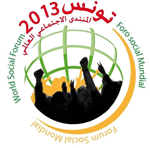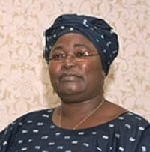Published on Thu, 2013-03-21 12:18
Members of the Reflection Group, of which Social Watch is part, launched a draft Reflection Paper on Universal Sustainability Goals for a Post-2015 Agenda prepared as a contribution to the Civil Society Conference on the Post-2015 Agenda that started this week in Bonn. The paper pointed that the debates on an agenda for international co-operation and development beyond 2015 offer the opportunity to (re-)address in a holistic manner well-being and justice in societies. Given the economic, social and ecological challenges in the world, this is urgently needed. |
Published on Thu, 2013-03-21 12:11
Social Watch will organize -together with different partners- a number of meetings during the World Social Forum 2013 to be held March 26 -29 in Tunisia. These meetings will be an opportunity to review and reconsider new challenges of the Post 2015 framework and the challenges the Arab countries are going through after the Arab Spring. |
Published on Thu, 2013-03-21 11:53
Civil Society Organizations issued a statement that outlines the priorities and recommendations they have identified for the post-2015 development framework. These build on the new emerging challenges as well as the lessons learnt from the initial MDGs process’ failures and gaps. The CSO declaration was released during the Arab Regional Consultation on the post-2015 development agenda that was held on March 14, 2013, in Beirut, Lebanon. The meeting provided an opportunity to gather the views of civil society coalitions and key UN agencies the region. |
Published on Thu, 2013-03-21 11:11
Dr. Emily Sikazwe, former SW Coordinating Committee co-chair, was selected as exceptional women to celebrate International Women’s Day and also to launch VIDEA’s 35 profiles of exceptional women. |
Published on Thu, 2013-03-14 22:09
Malta, like all New Member States of the European Union, pledged to reach a level of official development assistance (ODA) of 0.17% of its gross national income (GNI) by 2010 and to increase it to 0.33% by 2015. Does Malta keep its promises to eradicate poverty in the world? Civil society organizations have expressed their concern given that the government spends a large amount of ODA funds in the detention of irregular immigrants, many of them asylum seekers, the vulnerability of most of which is recognized through their refugee status or other forms of protection. Although the improvement in the distribution of ODA should be noted, 88% of bilateral aid is not clear. This is the reason why the government has been most criticized by NGOs in Malta and abroad. |








